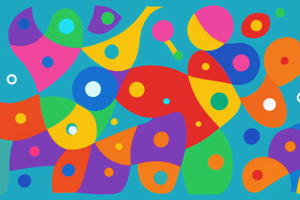Podcast
Questions and Answers
What did Jean Piaget propose in the field of child psychology?
What did Jean Piaget propose in the field of child psychology?
- Three main stages of emotional development
- Five main stages of social development
- Four main stages of cognitive development (correct)
- Two main stages of moral development
During which stage of cognitive development do babies primarily rely on their senses and physical actions to learn about objects and events?
During which stage of cognitive development do babies primarily rely on their senses and physical actions to learn about objects and events?
- Formal operations stage
- Preoperational stage
- Sensorimotor stage (correct)
- Concrete operational stage
At what age do most children develop the ability to think logically and follow rules?
At what age do most children develop the ability to think logically and follow rules?
- 2 years old
- 15 years old
- 10 years old
- 5 years old (correct)
Which aspect of development involves the formation of attachments with primary caregivers in infants?
Which aspect of development involves the formation of attachments with primary caregivers in infants?
What is a key skill that children acquire during childhood according to the text?
What is a key skill that children acquire during childhood according to the text?
Which stage of cognitive development involves the ability to perform tasks based on rules?
Which stage of cognitive development involves the ability to perform tasks based on rules?
What is a key aspect of emotional development in children according to the text?
What is a key aspect of emotional development in children according to the text?
At what age do children typically start developing friendships outside of family members?
At what age do children typically start developing friendships outside of family members?
What is a major role that peer interactions play in children's lives according to the text?
What is a major role that peer interactions play in children's lives according to the text?
According to Lawrence Kohlberg's theory of moral development, what does postconventional morality focus on?
According to Lawrence Kohlberg's theory of moral development, what does postconventional morality focus on?
What is a critical aspect of emotional development that children need to learn according to the text?
What is a critical aspect of emotional development that children need to learn according to the text?
How can understanding childhood from a psychological standpoint benefit education systems according to the text?
How can understanding childhood from a psychological standpoint benefit education systems according to the text?
Study Notes
Childhood is a time of rapid growth and development both physically and mentally. It's a crucial period when children acquire fundamental cognitive skills such as learning how to communicate effectively, form relationships, and develop problem-solving abilities. In this article, we will delve into various aspects of childhood from a psychological perspective, including the stages of cognitive, social, emotional, and moral development.
Cognitive Development As children grow through their early years, they undergo significant changes in their thinking processes. Jean Piaget, a prominent figure in child psychology, proposed four main stages of cognitive development which span throughout infancy to adolescence. These stages include sensorimotor, preoperational, concrete operational, and formal operations stages respectively. During each stage, children acquire new ways of understanding and interacting with the world around them. For instance, during the sensorimotor stage, babies primarily rely on their senses and physical actions to learn about objects and events; while by the age of five, most children have developed the ability to think logically and perform tasks based on rules they can follow.
Social Development From birth until approximately two years old, infants begin forming attachments with their primary caregivers, laying the foundation for future interpersonal relationships. As children mature, they become more aware of others' thoughts and feelings, leading to a heightened sense of empathy and cooperation. By age six, kids typically start developing friendships outside of family members, engaging in shared playtime, and negotiating conflicts together. Furthermore, peer interactions play a vital role in shaping self-concept and identity formation, especially during middle childhood when children compare themselves to their peers more frequently.
Emotional Development In her book 'The Wonder Years', clinical psychologist Judith Singer explores children's emotional lives, highlighting that between ages three and nine, youngsters experience intense emotions often. They feel joy, pride, shame, guilt, disappointment, anger, embarrassment, insecurity, love, excitement, sadness, fear, anxiety, jealousy, grief, relief, admiration, envy, sympathy, understanding, curiosity – all the things that adults routinely feel too. But because children’s brains and bodies aren’t fully formed yet, these powerful feelings tend to wash over them like waves, overwhelming their small frames... And often it seems that one emotion spins off another like dominoes. Emotion regulation is also a critical aspect of emotional development, whereby children learn strategies to manage their feelings appropriately instead of being overwhelmed by them.
Moral Development Children do not innately possess morality; rather, it must be learned through experiences, guidance, and observation. Lawrence Kohlberg proposed a theory of moral development based on his studies conducted mainly among males aged ten and older. He identified three levels of moral reasoning: preconventional, conventional, and postconventional. Preconventional morality revolves around avoiding punishments, gaining rewards, and conforming to societal norms for self gain. Conventional morality involves following rules set by authorities and acting fairly towards others. Postconventional morality focuses on abstract principles and individual rights independent of external authority.
Educational Implications Understanding childhood from a psychological standpoint has significant implications for education systems worldwide. Teachers need to consider students' cognitive, social, emotional, and moral development when planning curricula. This includes providing opportunities for hands-on learning, fostering positive social interaction, supporting emotional wellbeing, and encouraging decision making based on sound values. Additionally, educators should recognize the importance of play in children's lives and incorporate activities that promote creativity and exploration within structured settings.
Conclusion Childhood is a dynamic phase filled with rapid change and growth. Children progressively develop cognitively, socially, emotionally, and morally as they navigate life's challenges and opportunities. Understanding these developments can help parents, teachers, and other professionals better support children's journey into adulthood.
Studying That Suits You
Use AI to generate personalized quizzes and flashcards to suit your learning preferences.
Description
Explore the key aspects of childhood development from a psychological viewpoint, including cognitive, social, emotional, and moral development. Learn about the stages proposed by Jean Piaget, attachment formation, emotional experiences in children, moral reasoning according to Lawrence Kohlberg, and the educational implications of understanding childhood psychology.




